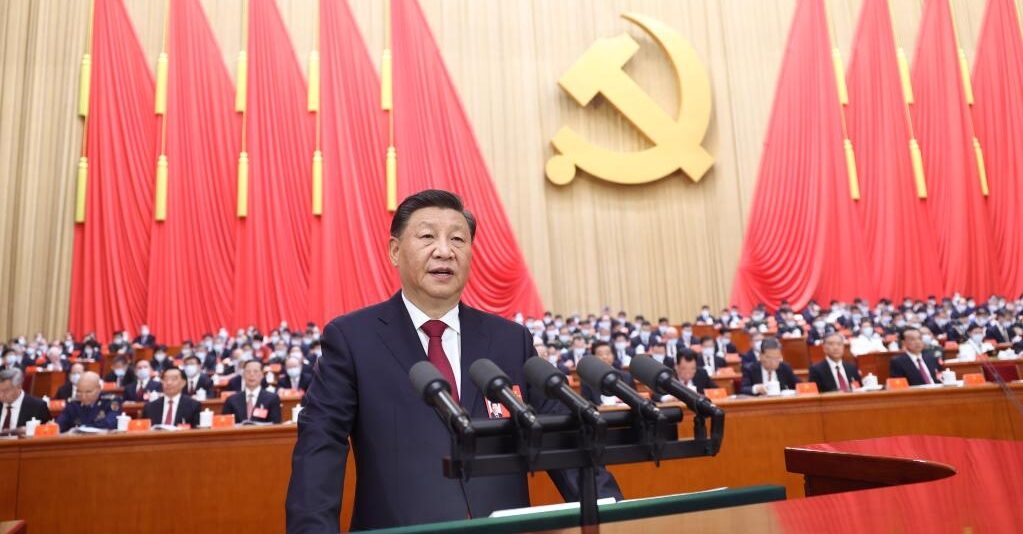Beijing, Oct 18 (UiTV/IANS) – Rare but definite voices of dissent were heard in Beijing in the final run-up to the 20th Party Congress of the Chinese Communist Party to give a third term of power to President and party General Secretary Xi Jinping.
Foreign Policy was the first Western media outlet to report that “banners featuring defiant political messages and sharp criticism of Chinese President Xi Jinping briefly dangled from an overpass in Beijing, in a rare � and dangerous � expression of dissent just days before China’s 20th Party Congress on Sunday”.
It said the banners were surrounded by waves of smoke that drew attention to them. They displayed slogans that demanded Xi’s removal and the end of China’s rigid zero-Covid policy. Photos of the protest initially spread on social media, although authorities swiftly wiped them from the internet.
One banner said: “Let us strike from schools and from work and remove the dictatorial traitor Xi Jinping” while another, according to Foreign Policy, said: “No Covid test, we want to eat. No restrictions, we want freedom. No lies, we want dignity. No Cultural Revolution, we want reform. No leaders, we want votes. By not being slaves, we can be citizens.”
The media publication quoted Zongyuan Zoe Liu, a fellow at the Council on Foreign Relations, as saying that it was a “very brave, and in many ways, also very sacrificing” move with its proximity to the start of the Party Congress, which she described as perhaps the “most important political event in China”. She was clear it was a “very risky move to do this in such a public and relatively high-profile manner”.
With protests in the form of banners or sit-ins being reported from some parts of the capital authorities in China have heightened surveillance and harassment of government critics ahead of the impending 20th congress.
According to media reports, since mid-September, a great number of petitioners and activists trying to influence the government have been imprisoned or placed under house arrest throughout China, and a great deal of human rights attorneys have been intimidated, followed, and harassed. They claim that officials are making every effort to suppress them ahead of the twice-decade event, which began on Sunday, because they are concerned that their critiques of the government would cause societal unrest and harm the regime, as reported by the Guardian.
Some of the reactions of the protesters were candid: “Every morning, the police would call me to check my plan for the day. They order me not to go anywhere, see anyone or say anything to them,” said one lawyer who was debarred and had his law firm closed for defending politically sensitive cases. “The message is clear: ‘We are watching your every move’.”
The lawyer, who asked to remain anonymous out of fear of retaliation, claimed that Chinese social media companies block all of his posts and that even when he writes on Twitter by sneaking through the firewall, the local police summon him and give warnings for doing so.
Meanwhile, several media reports said that lawyer Yu Wensheng, who has served four years in prison, was prevented from leaving his housing complex early in the second week of October by security personnel. Prior to the Congress, he said that police had advised him against visiting foreign embassies, speaking with media, or posting on Twitter. “I guess they’re trying to terrify us, but I’m not going to back down,” he said.
Wang Quanzhang, a different rights attorney who was imprisoned on subversion charges for defending activists, claimed that authorities had increased surveillance of his family. Li Heping, a seasoned attorney, was treated similarly. Since the middle of September, according to Wang Qiaoling, his wife, plainclothes police officers have been manning their housing compound and police cars have been following them wherever they go. She described it as an attempt to intimidate them. Security cameras surrounding the home of lawyer Xie Yanyi have all just been refurbished, and police cars are stationed outside his gated community. Lawyer Jiang Tianyong continues to be closely monitored in his small hometown in rural Henan with little access to the outside world.
Foreign Policy reported that authorities “have tightened already-rigid measures in the lead-up to the event, including by bolstering Beijing’s police presence, curbing travel, and ramping up testing in an effort to avoid Covid-19 outbreaks”.




